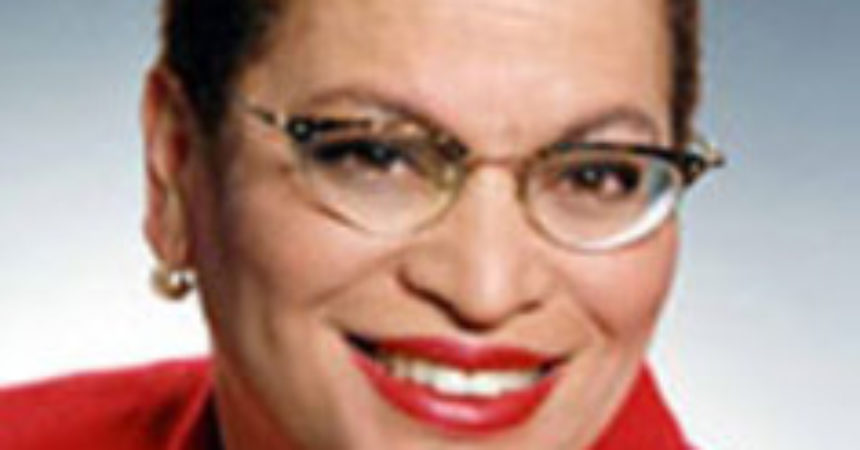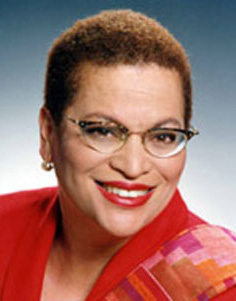
Rev. Barbara Skinner and intergenerational leadership

By Julianne Malveaux
Trice Edney News Wire
Barbara Williams Skinner, at 75, looks at least two decades younger than her birth certificate suggests. Much of her youthful energy is due to her discipline, which includes a mindful prayer practice, a vegetarian diet, and a focused mind. But as much of her youthfulness, I think, can be attributed to her engagement with emerging leaders, the younger people who are poised to lead and learn. On Nov. 29, she celebrated the 25th anniversary of the Skinner Leadership Institute (www.skinnerleadership.org), the organization she founded to offer leadership lessons to both emerging and established leaders.
While well known in Washington political circles, as the founder (with her now-deceased husband Tom Skinner) of the Prayer Breakfast at the Congressional Black Caucus Annual Legislative Conference, Skinner is not the household word that she should be. She has been a spiritual advisor to many members of Congress and to President Barack Obama, and she has done the “bridge building” work of bringing together African American leaders who have sometimes had contentious relationships. For more than a decade, she pulled corporate, political, and community people together for a retreat that involved both learning time and bonding time. Coretta Scott King, Betty Shabazz, Maya Angelou, and Dick Gregory were among those who attended the retreat.
Barbara Skinner was the first Executive Director of the Congressional Black Caucus. Although she was raised by a hard-working, God-fearing mother, Skinner spent much of her young adult life mad at God. She writes movingly of her journey in her new book, “I Prayed, Now What: My Journey from No Faith to Deep Faith” (Fortune Publishing Group: 2018).
Barbara writes about her struggle to embrace God, her relationship and marriage to Tom Skinner, who had been a spiritual advisor to, among others, the Washington Redskins, and about ways to pray for political enemies. She spoke of these things, and many more, at the celebration of the Skinner Leadership Institute, an event that not only celebrated Skinner and her leadership, but also lifted up some of the women around her. The intergenerational group she lifted up included Melanie Campbell, of the National Coalition for Black Civic Participation and Chanelle Hardy, who holds a leadership role at Google and is an alumna of the Skinner Leadership Master Series for Distinguished Leaders. Elders like Johnnetta Betsch Cole (former president of both Bennett and Spellman Colleges), the Honorable Constance Berry Newman (perhaps the only Black woman to have served under 7 Presidents, with 5 Senate confirmations), the Honorable Alexis Herman, 23rd Secretary of Labor, and former Essence Editor in Chief and founder of National Cares Mentoring Inc. Susan Taylor. Former DC First Lady Cora Masters Barry was among the other elders lifted up. It was characteristic of Barbara to share her celebration with women who have made a difference in her life and in the lives of others.
Barbara Skinner has always embraced emerging leadership and provided a bridge for younger leaders to connect with seasoned one. I’ve had the pleasure of mentoring young women through her Master Series for Distinguished Leadership for more than a decade, and have enjoyed the energy and ideas that these young sisters have brought into my life. But with Congresswoman Barbara Lee “in the house” after her stinging defeat to be Democratic Caucus Chair, there were angry whispers among some of us gathered about the meaning of intergenerational leadership. Was New York Congressman Hakeem Jefferies disrespectful and opportunistic (yes) in going after a position that Lee had been campaigning for more than eight months (full disclosure – I helped)? What does it mean that there is no Black woman in the formal leadership of the House of Representatives, even though Black women are the backbone of the Democratic Party? Does intergenerational leadership mean that seasoned leaders have to step aside, or does it suggest that emerging leaders need to pull a chair (not a treacherous knife) up to the table? Even as we enjoyed a loving tribute to someone who has been a bridge (a word used frequently, and a word that Skinner’s pastor, Dr. David Anderson, used to describe her), there was appreciation of Congresswoman Barbara Lee and anger about Hakeem Jeffries.
African American millennials may be justifiably impatient when Baby Boomers and those even older dominate African American leadership. With the top three Congressional Democrats, Pelosi, Steny Hoyer, and James Clyburn, and also Barbara Lee all over 70, there is a compelling case to be made for the younger Jefferies, under 50, to be included in Congressional leadership. At the same time, there is something to be said for seasoned leadership, and for the inclusion of the exceptional and courageous African American Barbara Lee, in leadership. There were undoubtedly other issues, including those geographic and philosophical (Jeffries is more moderate than Lee, and Lee’s chairmanship would have put two Californians in the top four leaders), but true intergenerational cooperation would require something more than the gangsta move Jefferies pulled to eke out his win (by 10 votes).
After the midterm elections, the Congressional Black Caucus has emerged as a powerful bloc among Democrats, with a massive 53 members, nearly a quarter of the 235 Democrats who will be seated in Congress in January. The group’s power is weakened, however, when there are intergenerational conflicts and fissures among the membership. The Jeffries victory over Barbara Lee represents such a fissure. It will take the faith, fortitude and focus of prayer warrior Rev. Barbara Williams Skinner to help the Caucus embrace its highest and best purpose. If you don’t know Dr. Skinner, Google her!
Julianne Malveaux is an author and economist. Her latest book “Are We Better Off? Race, Obama and Public Policy” is available via www.amazon.com for booking, wholesale inquiries or for more info visit www.juliannemalveaux.com







